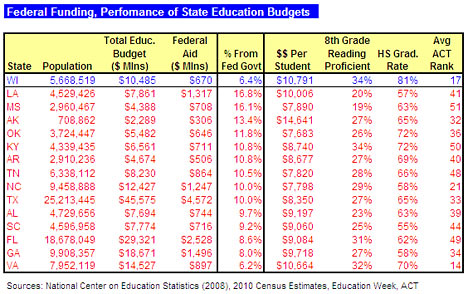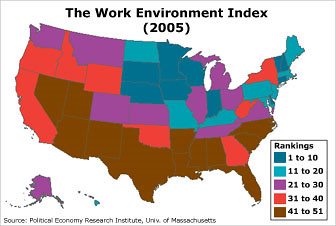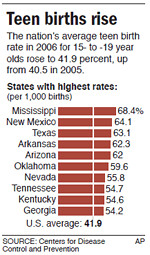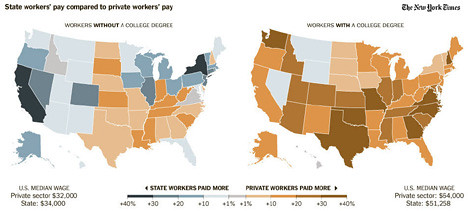
For social conservatives, it is often said, life begins at conception and ends at birth. If so, nowhere is that more true than in Mississippi. After all, the Magnolia State seems poised to pass Amendment 26, the so-called "personhood" initiative which by defining a fertilized egg as a human being would ban virtually all abortions and inevitably outlaw many forms of birth control and in vitro fertilization.
But while Mississippi is focused inside the womb, there seems to be little concern about what happens to its residents outside of it. As the dismal rankings in out-of-wedlock births, poverty, family income, education, health care and almost every other indicator of social dysfunction show, personhood is a painful struggle for the actual persons of Mississippi.
With some of the most draconian abortion restrictions in the nation, Mississippi is now home to only one clinic providing the procedure. But as it turns out, Mississippi is also home to the most depressing statistics for out-of wedlock births in the entire nation. As the numbers from the U.S. Census Bureau show, Mississippi has the highest percentage of total births to teen mothers (17.1 percent, compared to the national average of 10.5 percent) and unmarried women overall (53.7 percent, compared to 39.7 percent nationally).
Mississippi may not be a Hobbesian dystopia where life is nasty, brutish and short. But as a quick glance at the poverty and income data show, life there isn't easy. The Census Bureau's 2011 Statistical Abstract (which is based on 2008 data), shows poverty and median household income is worst where GOP's laissez-faire crowd finds its strongest support. Financially speaking at least, life is no heaven on earth in America's most religious state.
Of course, Mississippi is one of the poorest states in the Union and has been for some time. According to the 2011 data compiled by the U.S. Census Bureau, Mississippi ranks first in the number of people living below the poverty line. Unsurprisingly, its 50th ranking median household income of $37,790 is the lowest in America, and over $14,000 below the national figure. Per capita income is similarly dismal. It's with good reason that in 2007, Mississippi ranked fourth in per capital federal aid.
That need for federal funding is especially acute when it comes to one of the Magnolia State's greatest failures: education.
The education of its children provides just one of many heart-breaking stories of failure for the people of Mississippi. At $7,890 per student per year, Mississippi ranks 45th in school funding. (And even that meager figure is only made possible by substantial funding from the federal government.) According to the National Assessment of Educational Progress tests administered by the U.S. Department Education, only 22% of Magnolia State fourth graders read at or above grade level. By eighth grade, the figure falls to 19%. (Only the District of Columbia does worse.) It's no surprise that Mississippi has the lowest mean score on the ACT college admissions test taken by 96% of the state's high school graduates. And as it turns out, only 63% of its children even graduate, less than the national average of 69% (and much lower than the 81% in, for example, that target of right-wing retrograde reform, Wisconsin.)

And if the pitiful schooling of its children is ultimately a driver of Mississippi's crippling poverty, so too are the abysmal conditions for workers. One of the nation's so-called "right-to-work" states (which prohibit workers from being required to join a trade union as a condition of employment), in Mississippi private sector and public sector employees alike face lower pay and more unfriendly work environments.
Just how unfriendly was documented six years ago by the Political Economy Research Institute at the University of Massachusetts. The report, titled "Decent Work in America: The State-by State Work Environment Index 2005", offers an assessment of the best work environments in the United States. The top five states were Delaware, New Hampshire, Minnesota, Vermont and Iowa, at the bottom were Mississippi, South Carolina, Utah, Arkansas Texas and Louisiana. (For the full data tables, analysis and methodology, see the report's technical background paper.)
As a rule of thumb, if your state voted for John McCain in 2008, workers there don't have it very good. All of the top 5 states voted for Barack for President; all 10 bottom dwellers are residents of George W. Bush's Red America.

There are few surprises among the worst performing states in the Work Environment Index. Virtually all below the Mason-Dixon Line, the WEI laggards feature dismal pay and an outwardly hostile environment towards union organizing, workers' rights and collective bargaining. Red America is the home of the Right-to-Work (RTW) states. A leader in the Right-to-Work movement, Bush's home state of Texas was ranked 50th, with the percentage of workers with health and pension benefits running a full 10% below the top WEI performers.
And compensation for state and local public employees is worst among the usual suspects. As the New York Times documented two weeks ago, state workers without a college degree generally make more than their private sector counterparts ($34,000 versus $32,000, or a 6.3% gap), while college graduates make much less (a -19.9% gap). But in the reddest of states, public employees experience a pay deficit regardless of education level. In Mississippi, the pay penalty for state workers without a college degree is 11.9%; for college graduates the deficit is 16.9%.
(Click here to see full size image.)
Then there's the cataclysmic failure of the Mississippi health care system.
In its 2009 state scorecard, the Commonwealth Fund ranked Mississippi dead last in its assessment of health care access, prevention, equity, affordability and lifestyles. In December, the "America's Health Rankings" project also put Mississippi at 50th among the states. And in 2009, another UnitedHealth Group funded study concluded that Haley Barbour's home state had the unhealthiest residents in America.
And nationwide, health care is worst where Republicans poll best.
Two years ago, the Commonwealth Fund released its 2009 state health care scorecard. There, too, Mississippi led the Republican south -and the entire country - in providing dismal health care. Again, while nine of the top 10 performing states voted for Barack Obama in 2008, four of the bottom five (including Arkansas, Mississippi, Oklahoma and Louisiana) and 14 of the last 20 backed John McCain. (That at least is an improvement from the 2007 data, in which all 10 cellar dwellers had voted for George W. Bush three years earlier.)
It is sadly ironic that, for the most part, the states suing to prevent the implementation of the Affordable Care Act are the ones whose residents need it most. Among the leaders of that Republican effort? Mississippi.
Sadder still, Mississippi is also a leader of the GOP effort to gut the Medicaid program serving 60 million poor and elderly Americans. Governor and former RNC chairman Haley Barbour has trumpeted the conversion of Medicaid into block grants for the states to control. To make his case, Governor Barbour updated Ronald Reagan's old myth of the "welfare queen" for his own state:
"We have people pull up at the pharmacy window in a BMW and say they can't afford their co-payment."
That whopper didn't merely earn a "Four Pinocchio" rating from the Washington Post. It also obscured the fact that Haley Barbour's Mississippi is already home to perhaps the least generous Medicaid program in the nation:
Mississippi provides some of the lowest Medicaid benefits to working adults in the nation. A parent who isn't working can qualify only if annual family income is less than 24 percent of the poverty line. Working parents qualify only if they make no more than 44 percent of the federal poverty level. Seniors and people with disabilities are eligible with income at 80 percent of the poverty line...
Translated from the federal poverty guidelines, that means a working Mississippi couple with one child could earn no more than $8,150 a year and still qualify for Medicaid, seniors and people with disabilities could earn no more than $8,700, and a pregnant woman could earn no more than $20,000 a year.
And so it goes. Mississippi (along with many of its fellow red states) also leads America across a host of other social pathologies. Using data from the Census Bureau and the Legal Community Against Violence's state-by-state comparison of firearm laws, the Daily Beast in January concluded Mississippi was the deadliest gun state in the nation. Its divorce rate is among America's highest; the teen birth rate is at the very top. It's no stretch to conclude that Amendment 26 will only make that bad situation worse.
Back in May, Haley Barbour criticized President Obama, declaring, "What I learned as governor of Mississippi is that 'winning the future' doesn't start in Washington, D.C." Apparently, in Mississippi the future starts in a woman's body.
And ends there.
(This piece also appears at Perrspectives.)
















